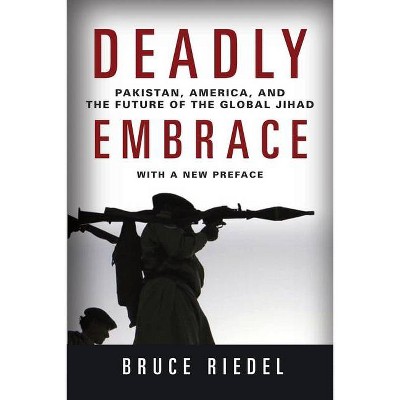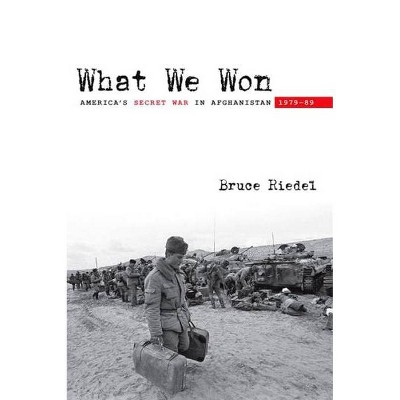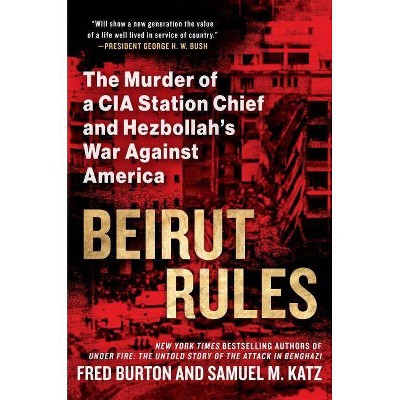Beirut 1958 - by Bruce Riedel (Hardcover)

Similar Products
Products of same category from the store
AllProduct info
<p/><br></br><p><b> About the Book </b></p></br></br>"In July 1958, U.S. Marines stormed the beach in Beirut, Lebanon, ready for combat. They were greeted by vendors and sunbathers. Fortunately, the rest of their mission--helping to end Lebanon's first civil war--went nearly as smoothly and successfully, thanks in large part to the skillful work of American diplomats who helped arrange a compromise solution. Future American interventions in the region would not work out quite as well. Bruce Riedel's new book tells the now-forgotten story (forgotten, that is, in the United States) of the first U.S. combat operation in the Middle East. President Eisenhower sent the Marines in the wake of a bloody coup in Iraq, a seismic event that altered politics not only of that country but eventually of the entire region. Eisenhower feared that the coup, along with other conspiracies and events that seemed mysterious back in Washington, threatened American interests in the Middle East. His action, and those of others, were driven in large part by a cast of fascinating characters whose espionage and covert actions could be grist for a movie. Although Eisenhower's intervention in Lebanon was unique, certainly in its relatively benign outcome, it does hold important lessons for today's policymakers as they seek to deal with the always unexpected challenges in the Middle East. Veteran analyst Bruce Reidel describes the scene as it emerged six decades ago, and he suggests that some of the lessons learned then are still valid today. A key lesson? Not to rush to judgment when surprised by the unexpected. And don't assume the worst"--<p/><br></br><p><b> Book Synopsis </b></p></br></br><p><b>What wasn't learned from a U.S. intervention that succeeded</b></p><p>In July 1958, U.S. Marines stormed the beach in Beirut, Lebanon, ready for combat. They were greeted by vendors and sunbathers. Fortunately, the rest of their mission--helping to end Lebanon's first civil war--went nearly as smoothly and successfully, thanks in large part to the skillful work of American diplomats who helped arrange a compromise solution. Future American interventions in the region would not work out quite as well.</p><p>Bruce Riedel's new book tells the now-forgotten story (forgotten, that is, in the United States) of the first U.S. combat operation in the Middle East. President Eisenhower sent the Marines in the wake of a bloody coup in Iraq, a seismic event that altered politics not only of that country but eventually of the entire region. Eisenhower feared that the coup, along with other conspiracies and events that seemed mysterious back in Washington, threatened American interests in the Middle East. His action, and those of others, were driven in large part by a cast of fascinating characters whose espionage and covert actions could be grist for a movie.</p><p>Although Eisenhower's intervention in Lebanon was unique, certainly in its relatively benign outcome, it does hold important lessons for today's policymakers as they seek to deal with the always unexpected challenges in the Middle East. Veteran analyst Bruce Reidel describes the scene as it emerged six decades ago, and he suggests that some of the lessons learned then are still valid today. A key lesson? Not to rush to judgment when surprised by the unexpected. And don't assume the worst.</p><p/><br></br><p><b> From the Back Cover </b></p></br></br><p>From today's vantage point, it is difficult--almost impossible, even--to recall that one U.S. military intervention in the Middle East turned out positively. It happened six decades ago, in a very different era, but lessons learned from then remain relevant today.</p><p>In July 1958, U.S. Marines stormed the beach in Beirut, Lebanon, ready for combat. They were greeted by vendors and sunbathers. Fortunately, the rest of their mission--helping to end Lebanon's first civil war--went nearly as smoothly and successfully, thanks in large part to the skillful work of American diplomats who helped arrange a compromise that ended the war. Future American interventions in the region would not work out quite as well.</p><p>Bruce Riedel's new book tells the now forgotten story of the first U.S. combat operation in the Middle East. President Dwight Eisenhower sent the Marines in the wake of a bloody coup in Iraq, a seismic event not only for that country, but eventually for the entire region. Eisenhower feared that the coup, along with other conspiracies and events that seemed mysterious back in Washington, threatened American interests in the Middle East. His response, and those of others, were largely driven by a cast of fascinating characters whose espionage and covert actions could be grist for a movie.</p><p>Although Eisenhower's intervention in Lebanon was unique, certainly in its relatively benign outcome, it does hold important lessons for today's policymakers as they seek to deal with the always unexpected challenges in the Middle East. Veteran analyst Bruce Riedel describes the scene as it emerged in the early 1950s, and he urges Washington to recall some of the key lessons from that time: Don't rush to judgment when surprised by the unexpected, and don't assume either the worst, or the best, especially in the Middle East.</p><p/><br></br><p><b> Review Quotes </b></p></br></br><br><p>"Bruce Riedel combines real-world policy experience and a profound understanding of the Middle East to weave a fascinating, complex tapestry of Cold War-era coups and conspiracies, culminating in President Eisenhower's unprecedented decision to deploy U.S. Marines to Beirut in 1958. With the action shifting swiftly among Arab capitals and Washington, this nonfiction thriller provides a cautionary note for today: how seeing the world through a zero-sum prism (Washington-Moscow then, perhaps Washington-Tehran today) can lead to distorted analysis and high strategic costs."--Jeffrey Feltman, former U.S. ambassador to Lebanon and former UN under-secretary-general for political affairs</p><br><br><p>"Bruce Riedel's book is a gripping and colorful account of the first U.S. combat operation in the Middle East. It's packed with narrative detail, including events Riedel witnessed himself as the young son of a United Nations worker in Lebanon. This brief but potent work from a seasoned expert--who has since witnessed a lifetime of events in the Middle East--offers wisdom from the Marines' fateful 1958 landing in Lebanon that is still relevant in a region that continues to confound U.S. policymakers."--Jane Harman, director, president, and CEO, Wilson Center; former member of Congress</p><br><br><p>"In 1958, 'America opened the Pandora's box of war in the Middle East, ' writes Bruce Riedel in this brilliant and original work. The events of that year--a history he recounts, informed by his own experiences as a child growing up in the region--have been largely forgotten. They should not be, as the analysis Riedel provides about past and present makes clear."--Steve Coll, dean, Graduate School of Journalism, Columbia University, and author of <i>Ghost Wars</i> and <i>Directorate S</i></p><br><p/><br></br><p><b> About the Author </b></p></br></br><p><b>Bruce Riedel</b> is the Director of the Intelligence Project at the Brookings Institution and a Senior Fellow in the Center for Middle East Studies. He is the author of <i>Kings and Presidents: Saudi Arabia and the United States since FDR</i> and five other books. Prior to coming to Brookings, he served thirty years in the Central Intelligence Agency with postings in the Middle East and Europe, and in the White House and Pentagon.</p>
Price History
Cheapest price in the interval: 22.49 on October 27, 2021
Most expensive price in the interval: 22.49 on November 8, 2021
Price Archive shows prices from various stores, lets you see history and find the cheapest. There is no actual sale on the website. For all support, inquiry and suggestion messages communication@pricearchive.us



















